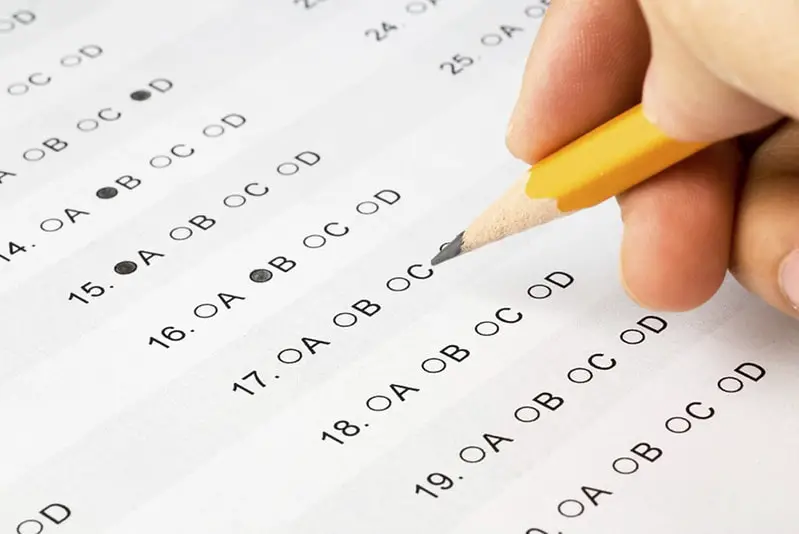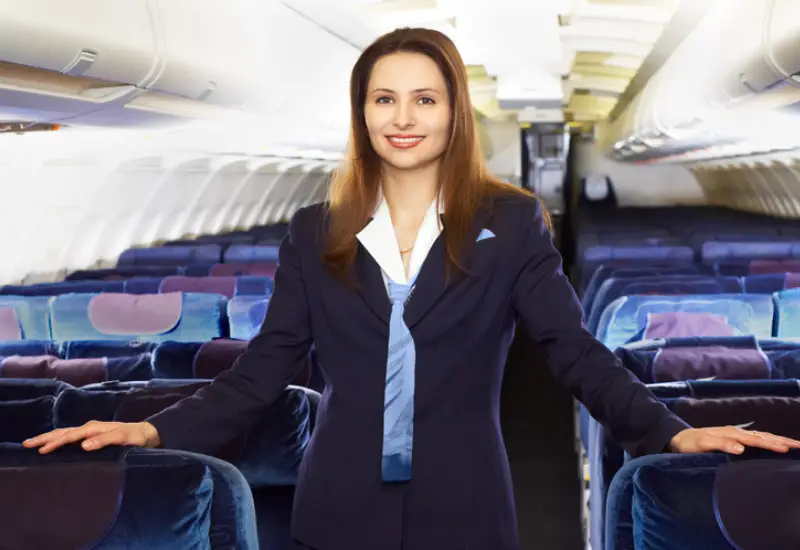In the world of aviation, English is the universal language. It’s not just a preference; it’s a must for any airline.
As a US-based flight attendant and part-time English teacher, I’ve got some tips to help you improve your language skills and prepare for a cabin crew interview.
Let’s ace that interview and land your dream job as a flight attendant!
Table of Contents
Why is English Important for a Cabin Crew Job?
Clear communication
On a plane, clear communication is essential among crew members.
Remember, being a flight attendant is primarily a safety position. One of the main roles of a flight attendant includes being able to respond to medical or emergency situations at any given time during flight.
Crew members need to be able to communicate thoroughly with not only the other flight attendants, but pilots, operations agents, passengers, and health care workers who may be on the plane or present over the radio during a medical emergency. As you can see, there are many possible lines of communication that can be open, frequently at the same time.
Language requirement
Even if you are not applying for a job within a country where English is the first language, all major airlines will still require a basic proficiency level in English. They may require a written and/or oral test upon recruitment.
Here are some helpful tools and steps that ESL (English as a Second Language) speakers can take to prepare for any interview or test and set themselves up for success!
Engaging Methods to Improve Your English Skills
 English Class
English Class
If you feel that you would like some extra practice with an English teacher, there are many resources available. In-person or online group classes can be found through college or university websites.
However, if fitting a weekly English class into your busy schedule is a little too inconvenient, there are some alternative options!
If you would prefer a one-on-one, online setting with a certified English teacher, check out some of the websites available for ESL students, such as Preply.com and Cambly.com. These websites are not only very affordable, but also provide a variety of date and time options, making it easy for the student to schedule classes at their personal convenience. This is a great way to not only learn more of the language, but also brush up on conversational skills, which will be highly beneficial for the interview.
Cell phone language apps have also become a popular choice. Some options include DuoLingo, Mango, and Babbel. These are also an engaging and affordable way to brush up on those speaking and writing skills.
 Learn a little Airline Lingo
Learn a little Airline Lingo
Just like there are many science and medical terms out there, there is tons of airline lingo! This can be challenging for even native English speakers, let alone ESL speakers. And to make it even more challenging, many of the terms are abbreviated.
For example, flight attendants are required to have memorized all of the airport codes for the destinations their airline flies to!
Some of these are tricky and look nothing like the city code. For example, ORD is the airport code for one of the airports in Chicago, IL, and RSW is the code for Fort Meyers, FL.
Start to prepare for these by checking out the airline’s website to see where they fly to, and becoming familiar with the airport codes ahead of time.
There are also various operational terms, such as a “deadhead” or a “federal aviation regulation”. But, don’t sweat just yet – you will learn most of these on the job! Regardless, it just helps to have a little basic knowledge of industry lingo.
A good start would be to check out an airline website and read through their core values, mission statements, job descriptions, and information about the company. This can help an aspiring ESL flight attendant familiarize themselves with some of the industry terms.
 Public Speaking
Public Speaking
Part of the flight attendant position is public speaking, specifically when we give our Public Announcements (PAs.) Even if half the cabin is snoozing, listening to headphones, or just not paying attention, it can still be intimidating for anyone.
If you’re lucky enough to know someone who works for the airline you would like to apply for, it’s highly recommended that you ask for a copy of the flight attendant PAs. If you can have these memorized and spoken clearly, it will help you to feel more confident in your interview.
I have also provided a few examples of flight attendant PAs a little further down in this article for your speaking practice!
Even if you don’t know someone, it would greatly benefit you to practice public speaking. Choose anything to read out loud! You can stand in front of a mirror or speak to a friend, or you can even record yourself and play it back to hear how strong your English sounds. Ask a friend or family member for notes or feedback!
 Watch TV
Watch TV

Look at this as a wonderful excuse to binge watch the latest season of that guilty pleasure reality show you love. Watch it in either your native language or in English, both with the subtitles on for easy translation practice.
For more of a challenge, you can watch it just in English! Pay attention to body language and/or intonation, such as the way lip movement forms specific words, hand motions, and cultural-specific gestures.
These different types of immersion in the TV programming will help boost those English reading and listening skills.
 Other Media
Other Media
There are other forms of media that can help improve English comprehension. Personally, I pay attention the best when I listen to podcasts. Find a topic you already know and little about and have a strong interest in so that you can already be familiar with the terms being used.
There are thousands of podcast options on apps such as Spotify and Apple Podcasts, so it’s guaranteed that there’s a good one for you!
Music is also another way to pick up on more English words. This can be tricky as some lyrics are hard to understand, even for native speakers. Look up lyrics online and have a little personal karaoke session. Before you know it, you’ll be ready for a flight attendant interview as well as your second career as the next Beyoncé.
 Read Everything
Read Everything

Read all kinds of books of different levels! The content really doesn’t matter. Whatever types of books you can pay attention to long enough to get some quality practice.
Read out loud if you can. Even if you have to look like that crazy person on the bus, it helps to move your lips while you read (quietly though, don’t actually be that crazy person.)
If you can’t stand books, try magazines, newspapers, websites, blogs, crossword puzzles, etc.
 Practice Conversations
Practice Conversations
One of my biggest insecurities when I travel is trying to learn a few words or phrases in another language and being worried about sounding silly or butchering the words. However, no one has ever faulted me or made me feel stupid for trying to learn.
In fact, most people in other cultures appreciated that I was trying and really liked to help!
Another way to practice is just to chat on the phone with a friend. Ask them to give you notes and feedback on your conversation skills. Just like working muscles out at the gym, the more you practice the foreign language-speaking mind muscle, the more you’ll feel comfortable trying out new words.
It’s this type of confidence that a recruiter wants to see in the flight attendant interview!
 Play Games
Play Games
Games are an awesome way to learn, and an opportunity to connect and have fun with friends. Get creative! Set up a jeopardy board or play charades. Create a matching game using those airport codes we talked about. It’s okay to giggle and learn at the same time, so spice it up with a bottle of wine!
 Plan for Success
Plan for Success
What are your goals? Do you want to learn 5 new words a day? Do you want to practice public speaking twice a week?
Whatever the goal is, I recommend getting a planner and writing down those goals. Not only will this keep you flying “en route” (airline term for, “in the right direction” 
Type of English tests

Let’s talk testing!
In the United States, an English test is not given out, but English-speaking proficiency will be determined through the interview.
However, holding a flight attendant position in other countries may require an English test.
Here are a few of the types of English Tests that could be given
 Multiple Choice Questions
Multiple Choice Questions
Multiple choice questions are a common form of tests. This is also the most beneficial to the applicant because it involves more recognition than memorization.
For example:
- What is NOT a characteristic of a flight attendant?
- a) lazy
- b) safe
- c) pleasant
- d) efficient
The correct answer is A
- Select the correct synonym for “delay”:
- a) postpone
- b) hurry
- c) announce
The correct answer is A
 Fill in the Gaps
Fill in the Gaps
Since one of the biggest reasons for the test is to see how well an applicant and hold a fluent conversation with passengers, some of the questions may be to complete a sentence, or “fill in the gaps.”
For example:
- Yesterday, we were delayed on the tarmac due to issues with weather. A passenger asked me whether or not she would be able to make her _____ on time.
- runway
- baggage claim
- connection
- boarding pass
The correct answer for this question is C
- We will be landing ____________ London Heathrow at 3:30 PM.
- a) on
- b) in
- c) at
The correct answer is C
 Reading Comprehension Tests
Reading Comprehension Tests
Reading comprehension may also take up a portion of the testing. For this, the applicant will read a text sample paragraph and answer questions about the content of the sample. In order to pass flight attendant training, it will be necessary to read and comprehend all sorts of different topics like safety, security, and emergency procedures.
Here is an example of a reading comprehension paragraph written in the B2 (intermediate) English level:
My name is Lily. I’m a flight attendant and work for an international airline. This is a great lifestyle for me because I have plenty of opportunities to visit new cities, and choose how I spend my time on my layovers. Before I became a flight attendant, I was working from home. I enjoyed the scheduling freedom, but I found it really hard to concentrate. There were just too many distractions around: housework that needed doing, another cup of tea, my family members wanting my attention for various things. So I started to go to a nearby café to work, but the Wi-Fi connection wasn’t ideal and I found myself drinking too much coffee. I was unhappy and looking for an alternative way to achieve a more ideal work-life balance. In the end, I decided to take a career in a completely different field, altogether. As a flight attendant, I enjoy getting dressed to go to work in the morning and being able to mentally thrive in a busier, more populated environment. Other flight attendants prefer an “on-the-go” lifestyle as well, and it is easy to have pleasant, relatable conversations with my co-workers.
Test question examples:
- Where does Lily work as a flight attendant?
- Why did Lily decide to change her career and become a flight attendant?
- How does Lily describe her interactions with co-workers?
- What are the advantages and disadvantages of working from home?
- This may require a little writing as well, so it will be beneficial to also have some writing skills. Which leads us into our next section…
 Writing an Essay
Writing an Essay
Writing an essay does require some knowledge of essay structure and presentation. In order to write a well-structured essay, you will need to separate your essay into three different sections:
- Intro – Presenting the topic
- Body – In-depth analysis of key points
- Conclusion – Final statement
Let’s pretend the essay topic is the following:
What are three things you would like to improve about yourself and why?
Start with an intro, which clearly lists the three key points about yourself that you would like to change. Include a brief summary of the key points.
The body of the essay is where you infuse as much detail as possible. For the body of this essay, there can be three paragraphs: One for each aspect of yourself that you would like to improve upon. Each paragraph would expand on each one of the points. Maybe the first point is that you have a tendency to be impatient. You want to explain what you get impatient about, how it has affected you negatively in the past, and what you plan to do to improve this aspect of your personality in the future.
The conclusion of the essay re-summarizes the key points. It also closes out the essay by wrapping up the ideas that were presented with an ending statement.
 SelfIntroduction
SelfIntroduction
A self-introduction might come in a few forms.
For example, it might be a writing paragraph, or it might be a conversational part of the interview.
Either way, it’s important to focus on clarity and confidence. After all, who knows you better than… Well, YOU?
There are a few ways to prepare for this:
- First, practice in the mirror! Talk to yourself about yourself.
- Second, think about a few positive aspects of your personality that you would like to convey to the recruiters.
- Third, make a list of your hobbies and interests at home before the interview. Put any emphasis you can on past interests or activities you’ve done involving aviation.
Here’s an example of a short introduction:
Hello, my name is Alexandra! I am applying to the flight attendant position because I have always had a strong interest in aviation. When I was a kid, my father would frequently take me to a place in town where we could see the airplanes take off from the nearby airport. Since then, I knew I wanted to be in the aviation industry. As a hobby, I love animals so I volunteer at the local dog shelter. I am empathetic and compassionate, and I believe this makes me a great fit for this career because I am able to connect and relate with people from all sorts of different backgrounds.
 PA Reading
PA Reading
The airline you are applying to may or may not have applicants memorize public safety announcements (PA’s) during training. While memorization won’t be a requirement for the interview, it definitely helps to practice an announcement out loud a few times beforehand to boost confidence and energy, and also to get a feel for the airline terminology.
The following are example of common PAs made during a flight:
Ladies, and Gentlemen! The captain has turned off the seatbelt sign, which means you can leave your seat now if you wish. However, for your own safety and the safety of others around you, you must keep your seatbelt fastened while you are seated. Should the seatbelt sign come on again during the flight, please return immediately to your seat, and for everyone’s safety, you must keep your belt fastened while seated.
Ladies & Gentlemen! In a moment, We will be distributing arrival cards and Customs and Quarantine declarations for L. A. There are three different U. S. immigration forms and each passenger will be required to complete one of these forms, depending on your nationality, passport or Visa status. There are no immigration requirements for U. S. citizens. If you hold a valid U. S. Visa, you are required to complete a WHITE I-94 Immigration Form. If you are traveling under the U. S. Visa Waiver Programme, then you must complete a GREEN I-94W Immigration Form. If you are not traveling under a U.S. Visa, then you must fill out a BLUE I-94T Immigration Form.
We’re approaching Seoul where the local time is 09:00. At this stage, you should be in your seat with your seatbelt firmly fastened. Personal television screens, footrests, and seat tables must be stowed away and all hand luggage stored either in the overhead lockers or under the seat in front. Please ensure all electronic devices including laptop computers and computer games are turned off.
 Group Discussion
Group Discussion
In a group discussion test, a large group of applicants will be divided into smaller groups and given a topic or project to work on together.
It may one of any given scenarios such as the following:
- How would you deal with a shortage of vegetarian meals on a flight?
- How would you handle a situation where a child is kicking the back of another passenger’s seat on a full flight?
The group could also be given a project to work on together. Here is an example:
- Create a brand new airline. What would it be called? What would be the core values? What are some cost-saving methods that would be used?
Whatever the topic is, keep in mind that there are a few things being tested here: English communication skills in discussion, participation level, and ability to work on a team.
Is it OK to Apply for a Cabin Crew job if You Are Not Fluent?
The answer is in theory, no. However, while being fluent is ideal, it’s possible to still get hired by a non-English-speaking airline with just a basic level of knowledge and ability to hold a conversation.
Not sure where your English level stands? You can take an EFSET (Free Standardized English Test) Check out EFSET.org to take a proficiency test that does not require any sign-up.
Results can be received on the CEFR scale (Common European Framework of Reference for languages,) which is a widely recognized scale, and can therefore be used on a CV/resume.
Additionally, language tutor websites, like Preply.com, require an English proficiency test before the first class with an English teacher and is included in the price of the class, so that is another great way to get an assessment of your speaking proficiency.
Conclusion
Considering all of the above steps and scenarios will help any ESL speaker to fly high and nail that interview!
And if there’s any further advice I can give, it’s to just be yourself! Have confidence in your practice and English-speaking skills.
Keep in mind that it’s okay to not have perfect English. Recruiters expect that you will make a few mistakes and having perfect English is not a job requirement. After all, it’s not how many “onomatopoeia” words you can come up with, but your shiny and unique personality that’s going to win them over in the end.
Happy flying!









Very useful article. Great job!
I felt like I have a burden on my shoulders, but after reading this I feel so relieved. It’s so helpful. Thank you
Happy to help Tracy!
You can do it
It’s really gonna help for future cabin crew and it’s really helpful for those who are for non vernacular medium. there are amazing and easy tips to learn English and improve our skills. thank you so much!!
Thank you so much, I failed from Qatar Airways at first time and I keep on blaming myself. When I read your blog, it is really cheer me up.
Thank you so much
This Information is so useful and reading and reading it more, felt like my dreams come true! Totally is a dream job for me and under those conditions, I’m actually going to apply next year. I’m the perfect candidate for this job!! I believe in me and i’m going to give my best!
I have being dreaming of becoming a flight attendant for years and I think I can do it but I only have one think that holds me. I am not good at spelling I can read and speak but no good at all of spelling so to you think I have a chance?
Of course Alejandro! Some airlines don’t even do a writing test. Besides, what I read from your comment seems pretty good to me! Take your chance
Thank you so much like I said I can read and speak English very good. My first language is Spanish. So I do have more then one language. Wich is good specially for the career that I want in the Airlines industry. But I am a little on secure on my English spelling. Speaking and reading no problem. And I have over 20 years on customer service. Thank you so much for writing back.
Thank you so much like I said I can read and speak English very good. My first language is Spanish. So I do have more then one language. Wich is good specially for the career that I want in the Airlines industry. But I am a little on secure on my English spelling. Speaking and reading no problem. And I have over 20 years on customer service. Thank you so much for writing back.